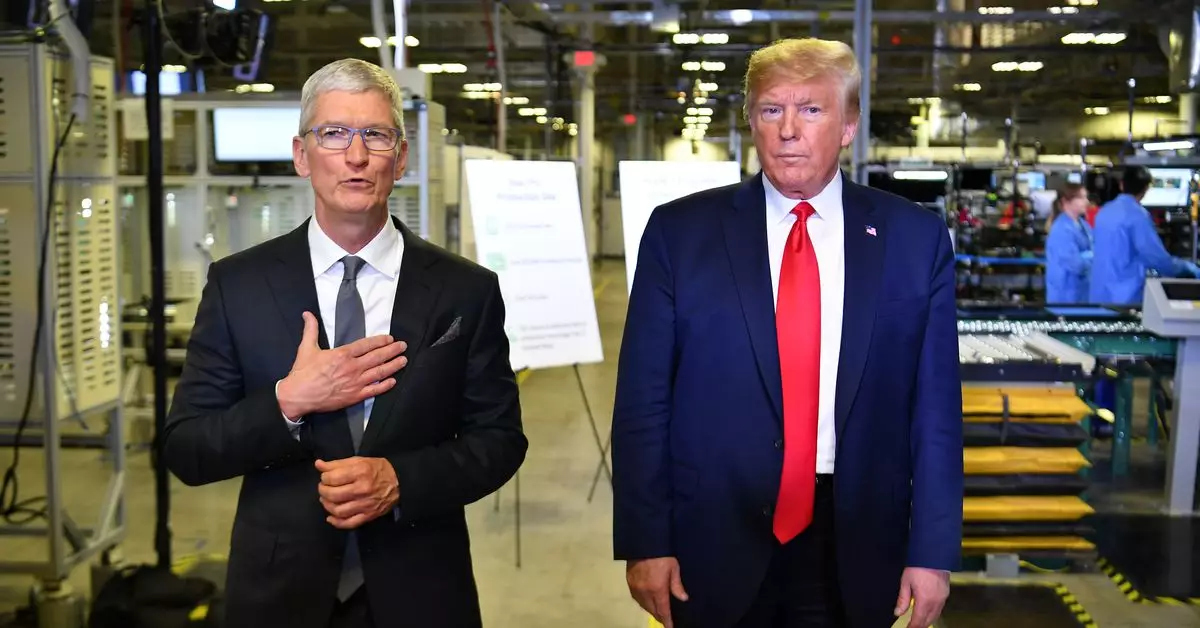In the modern landscape of technology and politics, establishing strong relationships can significantly influence corporate success. One of the exemplary cases is Apple CEO Tim Cook, who has successfully fostered a connection with Donald Trump during his presidency—culminating in strategic advantages for Apple that other tech leaders have struggled to attain. As detailed in a recent Wall Street Journal report, Cook’s deft approach may serve as a blueprint for other CEOs aspiring to navigate the intricate world of political alliances.
Unlike many tech executives who typically resort to formal communication channels, Cook opted for a more personal touch that involved direct conversations and dining experiences with Trump. Rather than sending lobbyists or political aides, he personally engaged with the then-president through phone calls and one-on-one meetings. This direct engagement allowed Cook to clearly articulate issues that mattered to Apple, such as tax reforms and tariffs, which were crucial to the tech giant’s operational economics.
A pivotal aspect of Cook’s strategy was his focus on simplifying complex discussions into digestible, focused points. As reported, he would enter meetings with a single data point to drive the conversation, thereby preventing dialogues from diverging into convoluted topics. This precision not only demonstrated respect for Trump’s time but also reinforced Cook’s authority as a leader capable of navigating complexities effectively.
Cook’s success wasn’t solely attributed to his personal interactions; it also stemmed from his ability to identify and emphasize areas of mutual interest with Trump. Both Cook’s strategic priorities and Trump’s administration often intersected on issues like job creation and domestic manufacturing—key themes that resonated well with the political narrative of the time. This mutual benefit was crucial, enabling Cook to bolster Apple’s standing while simultaneously enhancing Trump’s business-friendly image.
Interestingly, the article suggests that Cook’s strategy has sparked interest among other industry leaders who are keen to replicate his successful approach. Major corporations like Boeing and FedEx are reportedly attempting to forge their own direct lines of communication with Trump, aiming to secure favorable policies that would benefit their operations. The willingness of these leaders to follow Cook’s lead indicates a burgeoning trend among tech executives to engage more intimately with political figures.
In an age where conversational diplomacy can significantly skew business landscapes, Cook’s tactics reflect a shift in how corporate leaders may navigate political environments. As evidenced by reports of Sundar Pichai from Google and Mark Zuckerberg from Meta also attempting to connect with Trump, it seems that an atmosphere of flattery and direct communication is becoming increasingly common among tech giants.
While Cook’s relationship with Trump has yielded substantial benefits for Apple, it raises pivotal questions about the nature of influence and the ethics surrounding corporate engagement with political leaders. This dynamic requires careful consideration and a balanced approach, as the implications reach far beyond mere business transactions and touch upon broader societal concerns. As more tech leaders adopt Cook’s blueprint, it is crucial for them to tread thoughtfully in this complex interplay between technology and governance.


Leave a Reply